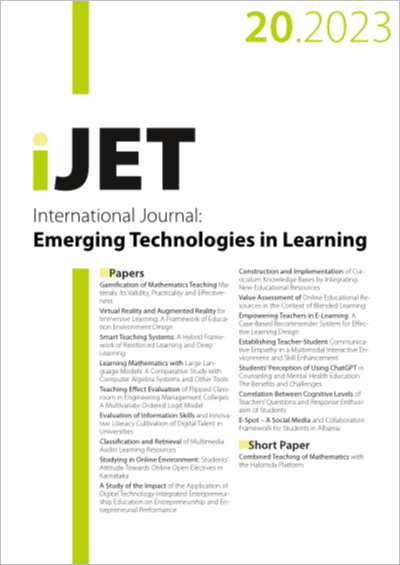Evaluation of Information Skills and Innovative Literacy Cultivation of Digital Talent in Universities
DOI:
https://doi.org/10.3991/ijet.v18i20.44211Keywords:
digital talents, information ability evaluation, innovative literacy, fuzzy comprehensive evaluation method, regression models, mediating effect models, moderating effect models, supply chain majorAbstract
In the context of globalization and informatization, cultivating the information ability and innovative literacy of university digital talents is of great significance for cultivating talents in supply chain majors. However, some shortcomings remain in the information ability evaluation and innovative literacy cultivation of university talents in the current education system. In this context, this study conducted in-depth research on the information ability evaluation of digital talents in universities and its impact on the cultivation of innovative literacy. The fuzzy comprehensive evaluation method was first adopted to make a quantitative evaluation of the information ability of university digital talents, which aimed to compensate for the shortcomings of existing qualitative evaluation methods. Then, regression models, as well as mediating and moderating effect models, were constructed to deeply analyze the impact of information ability on innovative literacy cultivation, aiming to reveal the complexity of the impact mechanism. This study aimed to provide new perspectives and methods for theory and practice, thereby improving the information ability evaluation system and the innovative literacy cultivation mechanism of digital talents in universities. This study is not only theoretically significant, but it also provides a practical reference for universities in cultivating talents in supply chain major.
Downloads
Published
How to Cite
Issue
Section
License
Copyright (c) 2023 Nan Zhang (Submitter); Songlin Wang, Li Zhou

This work is licensed under a Creative Commons Attribution 4.0 International License.



